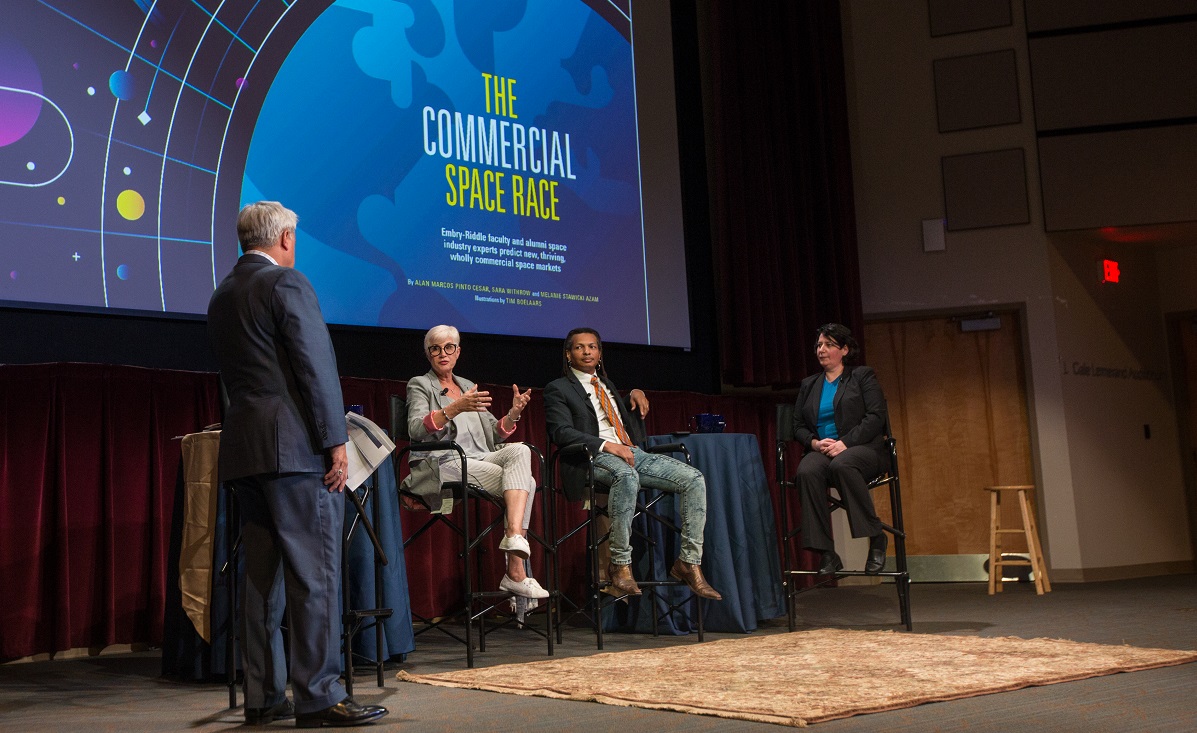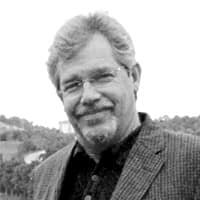The Commercial Space Race Takes Center Stage at Lift, Off the Page

The Embry–Riddle Office of Alumni Engagement hosted a lively discussion on the commercial space race Monday, April 9, to highlight the latest edition of Lift, Embry–Riddle’s alumni magazine. Marc Bernier, director of the university’s speaker series, spoke with experts in the field of space law, orbital mechanics and the commercial space industry in the Lemerand Auditorium at the Daytona Beach Campus.
Some of the topics were surprising.
Who is responsible for cleaning up the tens of thousands of pieces of space debris orbiting the Earth? The answer: No one at this point, but there are enterprises — including Weintraus, a company located at Embry–Riddle's Research Park developing a space tug — that hope to tackle the problem in the not too distant future.
How long until we will be able to book a room at a hotel orbiting the Earth? The answer: It is not that far away, but you may want to rethink the idea of being a space tourist.
Will we see piracy in space? The answer: It's highly likely.
Embry–Riddle spaceflight operations professor Diane Howard spoke about the pressing need for consensus on the laws, regulations and ultimately enforcement by everyone who is planning on having a presence in space, whether government or industry.
Alumnus Moriba Jah (’99, PC), an associate professor at the University of Texas at Austin and one of the leading experts in the world on orbital debris, chuckled at the idea of tourists in space. He said people have an idealized notion of floating in space and how wonderful it will be, but the reality will probably be more like dealing with symptoms of motion sickness and vertigo the whole time they are in microgravity. A large number of astronauts suffer from severe stomach upset in space, he said.
Noting that alumni are working at SpaceX, Virgin Galactic, United Launch Alliance, NASA and more, assistant professor Sonya McMullen (’00, WW) and Howard discussed how the university’s focus on aeronautics and aerospace means graduates can be found in almost every space-related company around the world. A great example is The Boeing Company, with over 4,000 alumni. The two also stressed the benefits to humanity of commercial space investment and related product spinoffs. McMullen cited GPS, as one example.
Jah got a big laugh when Bernier asked about the possibility of space pirates. He said, “Why not!” Much like seafaring pirates 300 years ago, he reasoned that once we have space colonies and more ships and satellites in orbit, we would probably see somebody trying to hijack cargo or satellites. Until space activities can be better quantified and observed, piracy is a plausible threat, Jah said.
In addition to a dialog between the panelists and the live audience, people across the country were tuned in to a live stream of the program and were able to participate in the Q & A.
You can watch a video replay of program and read all about the commercial space race in the latest edition of Lift, Embry–Riddle’s alumni magazine.

 James Roddey
James Roddey